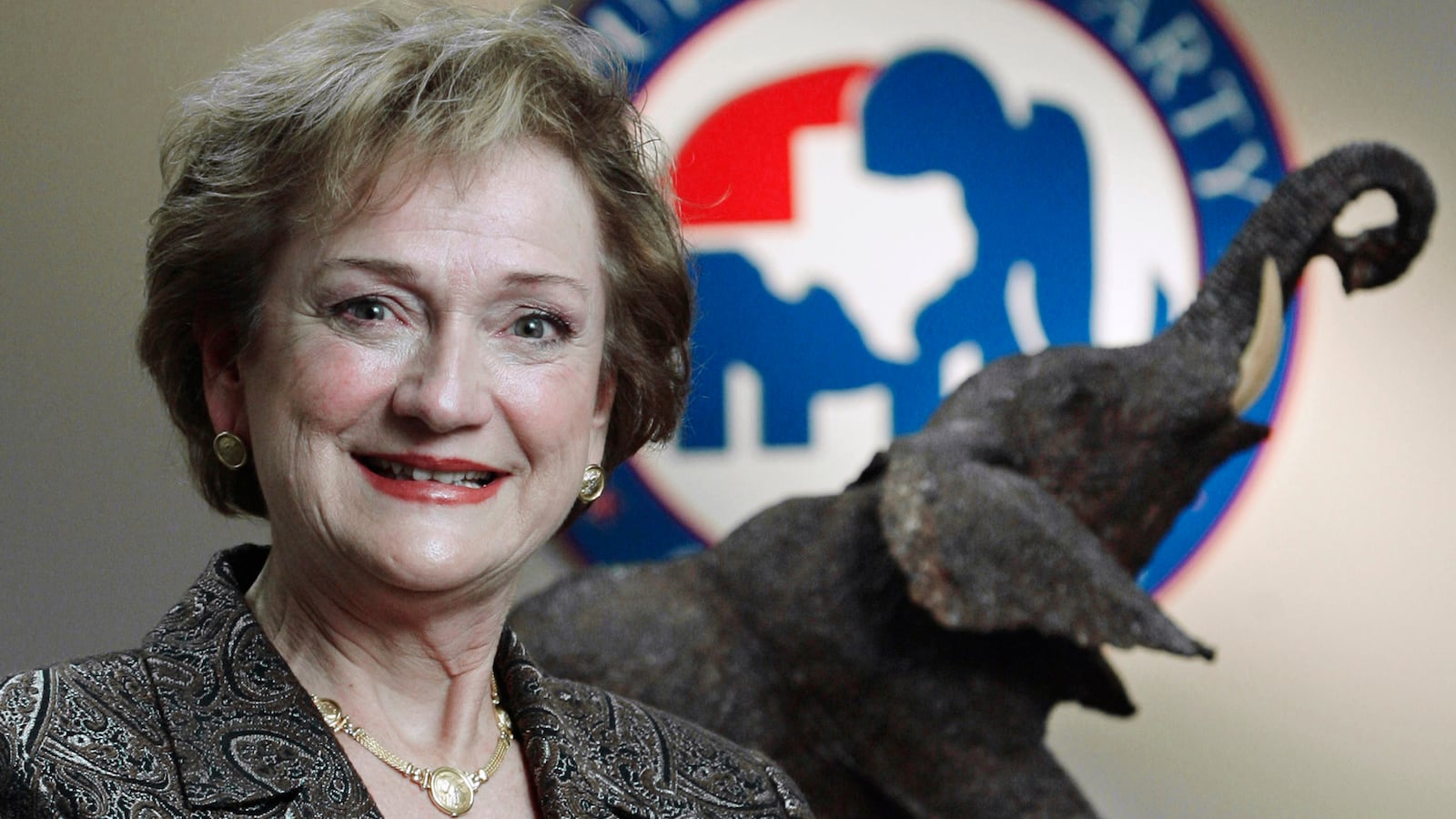Of the many arguments against comprehensive immigration reform, this from Republican activist Cathie Adams is one of the strangest.

Speaking to right-wing radio host Rick Wiles last week, Adams decried a measure in the Senate immigration bill that would require biometric scanning for non-citizens at airports. “[O]f course, we know in biblical prophecy that that is the End Times,” Adams said of the initiative. “That is going to be the brand either on our foreheads or on the back of our hands. That is demonic through and through. That is End Times prophecy. There is no question about that.”
Except there is. For the large majority of Christians (and Americans, writ large) who don’t hold fundamentalist eschatological views, this is either incomprehensible, misguided, or—at worst—near-heretical. For our purposes, however, it’s simply important to note that this idiosyncratic religious belief forms the basis for Adams’s opposition to comprehensive immigration reform. She has one other problem, too: that the bill would give “amnesty” to Muslims who don’t have the “best intentions” for the United States, which seems to rely on a distorted and prejudiced view of Islam and its adherents.
If Cathie Adams were just one of the countless activists or provocateurs that dominate conservative politics, this would be worth noting, but not commenting on. But she’s the former chairman of the Texas GOP, from 2009 to 2010, and that’s no small thing.
By size and population, Texas is the second largest state in the Union. It contains four of the country’s largest cities and metropolitan areas, and is a major engine of economic growth for the nation.
Texas Republicans don’t just dominate the state’s political landscape—controlling its legislature, 24 of its 36 congressional districts, both of its Senate seats, and all of its statewide offices—but they’re also a powerful force in national politics, and one of the most important wings of the GOP writ large. Not only is Texas the home state of the party’s most successful political dynasty—the Bush family—but its members play influential roles at all levels of politics, from John Cornyn at the Republican National Committee to Karl Rove at American Crossroads. Leading the state party is a big deal; it allows for significant influence over everything from candidate selection and outreach, to fundraising and platform writing.
In other words, Adams is a Texas GOP elite who reflects other, similar elites. There’s Rep. Louie Gohmert, who once warned that “radical Islamists” were “being trained to come in and act Hispanic,” which—for him—was a reason to oppose comprehensive immigration reform. Likewise, there’s Rep. Steve Stockman, who declared immigration reform a Democratic plot to “destroy America,” and Sen. Ted Cruz, whose vocal opposition reflects right-wing anger over the Gang of Eight proposal.
In fairness, it should be said that there are Texas Republicans who support immigration reform, and who are working to bring Latinos into the state Republican Party. This summer, chairman Steve Munisteri announced an effort to hire two dozen new full-time workers, and dedicate them to minority outreach, including Latinos. At the same time, groups like Hispanic Republicans of Texas—spearheaded by George P. Bush, son of former Florida governor Jeb Bush—have made heavy investments in Latino candidates for public office. Munisteri has been silent on comprehensive immigration reform, but Bush, like his father, is a supporter.
What you can’t escape, however, is that Cathie Adams and her ilk speak for a large number of Republicans—in Texas and nationwide—who oppose immigration reform. And while there is a sensible argument against reform—and the Senate bill in particular—the reality is that the most vocal opponents rely on Adams’s blend of paranoia and prejudice. Iowa Rep. Steve King, for example, argues that a path to citizenship will encourage drug runners to enter the country. “For every [immigrant] who’s a valedictorian, there’s another 100 out there that, they weigh 130 pounds and they’ve got calves the size of cantaloupes because they’re hauling 75 pounds of marijuana across the desert,” said King, doing his best to alienate Latino voters.
But even with people like King in the party, if just some House Republicans got behind an immigration bill, it would pass. And indeed, several GOP lawmakers have either dropped their opposition to citizenship, or announced their flexibility on the issue. For instance, in an interview Thursday, Rep. Dave Reichert of Washington state floated citizenship as a fair trade for greater border security. “I want to get to the point where they have to pay a fine, there are some penalties they have to go through, there are some steps they have to go through. I want to hold them accountable, and then they get citizenship,” he said.
The dilemma for the rest of the party is this: Do they want to stand with Cathie Adams and her ilk? Or do they want to join with Republicans like Reichert, who are trying to solve problems? The Adams contingent holds significant sway in the House of Representatives, but they aren’t all-powerful, and if enough Republicans decided on reform as a project worth pursuing, it would happen.
Beyond the narrow issue of a bill, the choice between Adams and Reichert expands into a broader question: What kind of party does the GOP want to be? Does it want to be one that can reflect a more diverse group of constituents, who may share similar interests but come from different perspectives? Or does it want to remain a redoubt for a shrinking minority of older whites? The GOP’s choice on immigration reform won’t answer the question, but it will push them in one direction or another. For the sake of our novel experiment in broad-based multiracial democracy, I hope they reject the Cathie Adamses of their party.






